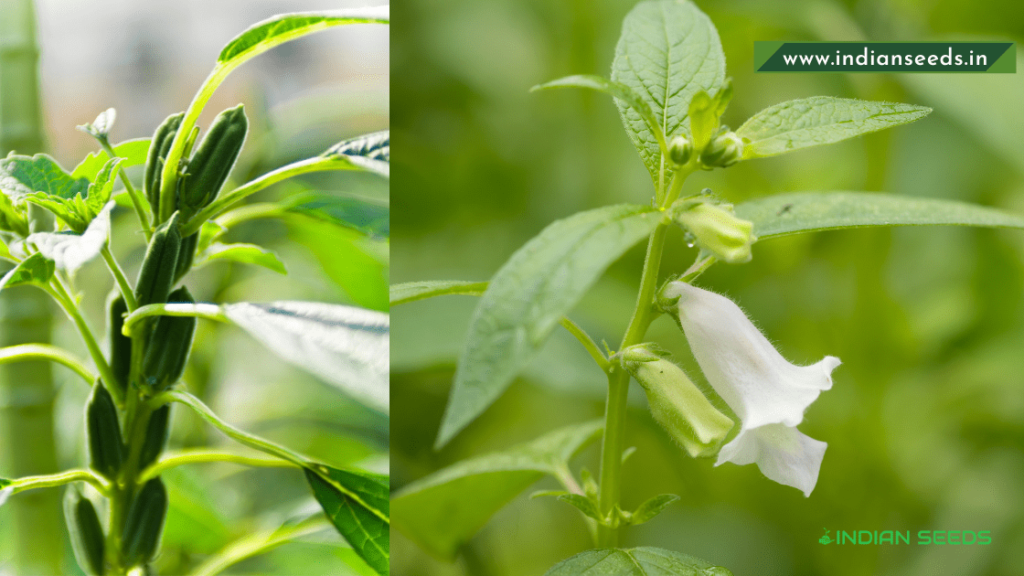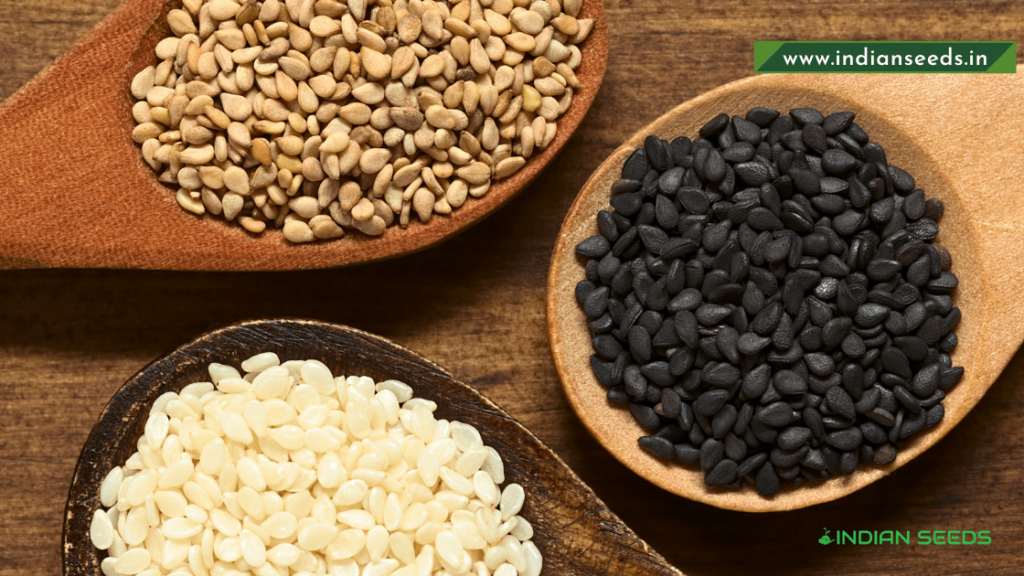Sesame Seeds - All you need to know about
Sesame seeds are thought to be one of the world’s oldest and most important condiments. They’re versatile, aromatic, and come in a variety of nutty textures. A range of Asian and Middle Eastern cuisines benefit from the seeds’ crunch. It can also be used as a cooking oil and in the preparation of sauces and dressings.
They’re widely used to give a nutty taste and crunchy texture to a variety of meals.
Sesame seeds has a variety of nutritional components that have a variety of health benefits in humans. Protein, vitamins, minerals, and antioxidants abound in sesame seeds.
Sesame seeds have the potential to boost heart health, decrease blood pressure, develop strong bones, improve male fertility, and control diabetes, among other things.
They may also aid in the treatment of depression and chronic stress, as well as improve digestion, reduce inflammation, boost respiratory health, and aid in dental care.
Sesame seeds are also utilized in soap, cosmetics, lubricants, and pharmaceuticals.
Sesame Seeds Common Names:
| Sesame Seeds in English | Daikon, Radishes, Japani Radish, Japanese Radish |
| Sesame Seeds in Hindi | तिल के बीज (Til) |
| Sesame Seeds in Tamil | எள் விதைகள்(Eḷ vitaikaḷ) |
| Sesame Seeds in Telugu | నువ్వు గింజలు (Nuvvu gin̄jalu) |
| Sesame Seeds in Marathi | तीळ (Tīḷa) |
| Sesame Seeds in Kannada | ಎಳ್ಳು (Eḷḷu) |
| Sesame Seeds in Malayalam | എള്ള് (eḷḷ) |
| same Seeds in Bengali | তিল বীজ (Tila bīja) |
| Sesame Seeds in Odia | ରାଶି (Rasi) |
Botanical Name: Sesamum indicum
Family: Pedaliaceae
Radish Vegetable is grown and eaten all over the world, with the majority of them being eaten raw as a crisp salad vegetable with a pungent flavour. There are several types, each with its own size, flavour, colour, shape and maturation time.
Sesame Seeds Nutrition:
Dried whole sesame seeds contain 573 calories per 100 g (3.5 oz) and are made up of 5% water, 23% carbs (including 12% dietary fibre), 50% fat, and 18% protein. Sesame seeds are high in iron, calcium, magnesium, phosphorus, and zinc, as well as various B vitamins and nutritional minerals.
NUTRITIONAL VALUE PER 100 Gram. (SOURCE: USDA NATIONAL NUTRIENT DATA BASE)
| PRINCIPLE | NUTRIENT VALUE | PERCENTAGE OF RDA |
| Energy | 573 Kcal | 29% |
| Carbohydrates | 23.45 g | 18% |
| Protein | 17.73 g | 32% |
| Total Fat | 49.67 g | 166% |
| Cholesterol | 0 mg | 0% |
| Dietary Fiber | 11.8 g | 31% |
| VITAMINS | ||
| Folates | 97 µg | 25% |
| Niacin | 4.515 mg | 28% |
| Pantothenic acid | 0.050 mg | 1% |
| Pyridoxine | 0.790 mg | 61% |
| Riboflavin | 0.247 mg | 19% |
| Thiamin | 0.791 mg | 66% |
| Vitamin A | 9 IU | |
| Vitamin C | 0 | 0% |
| Vitamin E | 0.25 mg | 2% |
| ELECTROLYTES | ||
| Sodium | 11 mg | 1% |
| Potassium | 468 mg | 10% |
| MINERALS | ||
| Calcium | 975 mg | 98% |
| Copper | 4.082 mg | 453% |
| Iron | 14.55 mg | 182% |
| Magnesium | 351 mg | 88% |
| Manganese | 2.460 mg | 107% |
| Phosphorus | 629 mg | 90% |
| Selenium | 34.4 µg | 62.50% |
| Zinc | 7.75 mg | 70% |
| PHYTO-NUTRIENTS | ||
| Carotene-ß | 5 µg | — |
| Crypto-xanthin-ß | 0 µg | — |
| Lutein-zeaxanthin | 0 µg | — |
Sesame Seeds Plant
Sesame Plant and Leaves
Sesame is an annual plant that grows 50 to 100 cm (1.6 to 3.3 ft) tall with opposing leaves that are 4 to 14 cm (1.6 to 5.5 in) long and have a complete edge. The leaves are broad lanceolate at the base of the plant, reducing to just 1 cm (0.4 in) wide on the flowering stem.

Sesame Flowers
The tubular flowers have a four-lobed mouth and are 3 to 5 cm (1.2 to 2.0 in) long. The flowers come in a variety of colours, including white, blue, and purple.
Sesame Fruits
Depending on the cultivar, sesame seeds come in a variety of colours. Off-white sesame is the most often traded type. Buff, tan, gold, brown, reddish, grey, and black are also common colours. The hull and the fruit are both the same colour.
Sesame Seeds Kinds

1. Black Sesame Seeds
The black type produces the highest quality oil and is ideal for therapeutic use. Antioxidants are more abundant in black sesame seeds than in brown sesame seeds.
Both the Ayurvedic and Chinese traditions regard black sesame as an anti-aging food. Natural black sesame seeds are mostly utilised for medical purposes as well as flavourings in a variety of bread products.
2. White Sesame Seeds
White sesame seeds are pear-shaped, flat, and off-white in hue. The seeds are bulbous at one end and taper down to a rounded apex, measuring around 3 millimetres in length.
The seeds are easy to crush or grind by hand, and they contain a lot of oil, so they make a paste. White sesame seeds have a pleasantly sweet taste and almost no aroma. They have a delicate, nutlike flavour. When eaten, the seeds have a subtle crunch that is pleasing to the palate.
Sesame Seeds Cultivation Practice:
| SOIL: | Sesame plants are tolerant of a variety of soil conditions, however proper drainage is essential |
| 🌡️TEMPERATURE: | 22°C to 30°C |
| ☀️ SUNLIGHT: | Direct Sunlight Required (Full Sun) |
| 🌊 WATERING: | Moderate |
| FERTILIZER: | Organic fertilizer is preferred. |
| HARVEST: | Before harvesting sesame seeds, make sure they have dried sufficiently on the plant within the seed pod. |
Important Benefits of Sesame Seeds

Sesame seeds have several health benefits, in addition to their nutritional worth, that will make you want to incorporate these small organic miracles into your diet right immediately.
1. Sesame Promotes Healthy Bones:
Sesame seeds, when combined with the hull, are a good source of calcium, especially for women, which helps to maintain healthy bones. Because these seeds contain natural chemicals such as phytates and oxalates, which might delay nutrient absorption, eat them after roasting, soaking, or sprouting.
This will cut the concentration of these natural substances in half, making it easier to absorb nutrients.
2. Sesame Seeds Help with Blood Sugar Control
Sesame seeds or oil, according to several studies, can help diabetics maintain their blood sugar levels. Because of its low carbohydrates, high protein, and healthy fats composition, it functions as an organic blood sugar regulator in the long run.
Furthermore, the presence of pinoresinol, a high-value plant-derived lignan with a variety of beneficial properties, is critical for maintaining and controlling blood sugar levels.
3. Sesame Seeds are good source of Fibre
Three tablespoons (30 grammes) of unhulled sesame seeds contain 3.5 grammes of fibre, which is 12 percent of the RDA (RDI).
Sesame seeds can help you enhance your fibre intake because the average fibre intake in the United States is only half of the RDI.
Fiber is widely known for its ability to aid digestion. Fiber may also play a role in lowering the risk of heart disease, certain malignancies, obesity, and type 2 diabetes, according to emerging data.
4. Hair Health Could Be Improved with Sesame Seeds
Plant polyphenols found in sesame seeds may aid to promote hair health. Because of the vitamins and minerals in sesame seed oil, it is frequently massaged into the scalp, which may help to prevent premature greying and promote hair development. This oil’s amino acids and antioxidants may also help dull hair regain its shine.
5. Sesame Seeds are good for your skin
Sesame seeds oil has a lot of benefits for your skin. They aid in the skin’s softness and suppleness. They’re high in anti-inflammatory compounds, which help to treat redness, sores, and other facial skin problems from the inside out. One tablespoon olive oil and two tablespoons of powdered sesame seeds can be combined. After dampening the mixture, apply it to your face. For optimal effects, do it once or twice a week.
6. Thyroid Health Benefits from Sesame Seeds
The thyroid gland has the largest concentration of selenium of any organ in the body, and it is essential for the production of thyroid hormones. Sesame seeds, both unhulled and hulled, provide about 18% of the selenium reference daily intake (RDI), making them an excellent dietary alternative for thyroid problems. Additionally, the inclusion of iron, copper, zinc, and vitamin B6 in these seeds improve thyroid health by supporting thyroid hormone production.
Sesame Seeds Culinary Use
Sesame seeds have been a staple of Indian cuisine for millennia. It is especially popular in the winter because of its warming properties. Til Pitha and Til Gajak are other popular treats throughout the winter months.
1. Til Ka Ladoo
Til ka ladoo is a snack created by blending the seeds with warm jaggery, sugar, or palm sugar and rolling them into balls.

2. Tahini
Tahini is a sesame seed paste that is used in a variety of dishes, particularly in the Mediterranean and Middle East. It’s vegan, gluten-free, has a nutty flavour, and is easy to prepare.
FAQ
Sesame seeds are popularly known as Til in Hindi. They are widely used in many Indian dishes.
Sesame seeds is called Roghni anag روغنی اناج in Urdu
Toasted sesame seeds can be sprinkled on top of stir-fries, salads, and soups as a condiment. The untoasted seeds can be used to make tahini paste, which is a common Middle Eastern ingredient. The nutty flavour and crunch mix nicely with a variety of sweet and savoury baked products. There are numerous recipes to select from.
Do you notice that your hair is falling out in clumps or that your skin’s radiance is fading? Then, before you pick up any synthetic skin or hair product, try sesame seeds. The seeds’ and oil’s organic properties help to restore the skin’s radiance and hair’s strength. These seeds are high in Vitamin B complexes including thiamine, niacin, folic acid, pyridoxine, and riboflavin, making them one of the best organic options for maintaining good skin and hair.
100g of Sesame seeds contain 18.3g of Protein
Sesame oil is Potentially Harmless when taken by mouth as a remedy for a short period of time. Some people may experience allergic reactions to sesame.
When applied to the skin, sesame may trigger allergic responses in some people.
‘Til’ in Hindi, ‘Nuvvulu’ in Telugu, ‘Ellu’ (Tamil, Malayalam, Kannada), ‘Teel’ in Marathi, and ‘Til’ in Bengali are all names for white sesame seeds.
RECENT POSTS:
-
The Blue-Black Wonder: A Comprehensive Guide to Black Turmeric (Curcuma caesia)
-
Cold Pressed vs Regular Neem Oil: Which One Is Better?
-
Use of Diatomaceous Earth for Bed Bug Control
-
Health Benefits of Eating Pumpkin Seeds
-
Understanding Pests and Their Control: A Guide to Modern Agricultural Practices
NUTRITIONAL VALUE PER 100 G. (SOURCE: USDA NATIONAL NUTRIENT DATA BASE)


















